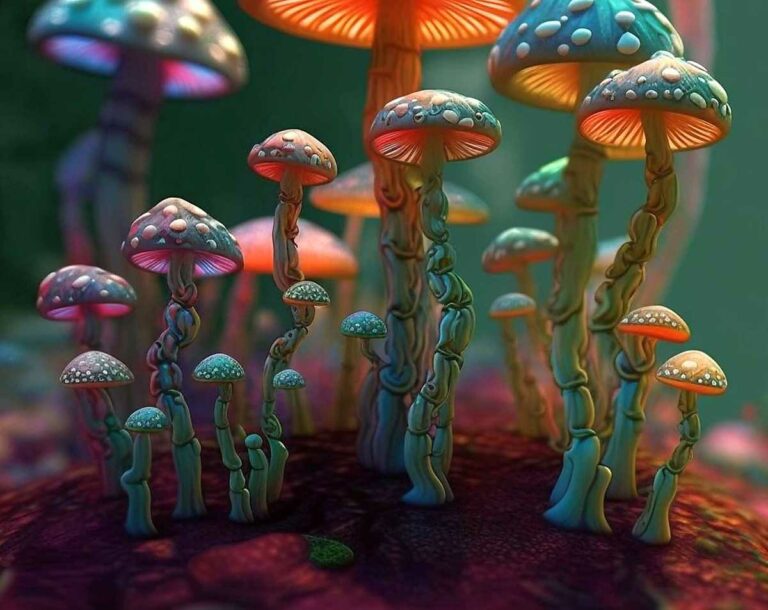Have you ever considered incorporating psychedelic mushroom therapy into your practice? As the field of psychedelic therapy continues to gain traction, professionals are increasingly looking to add this modality to their repertoire.
Incorporating therapeutic psychedelics may offer your clients a powerful tool for personal healing and transformation, especially given the ratifying studies on the potency of hallucinogens for depression, anxiety, and PTSD.
While the rewards can be immense both for the facilitator and the journeyer, guiding a psychedelic journey on substances like psilocybin and LSD is not for the faint of heart.
Whether you’re a practicing clinician looking to broaden your approach or simply curious about guiding psychedelic journeys, there are some important things to consider before plunging into the fascinating realm of facilitating.
That’s why in this article, we interviewed a psychedelic facilitator within our network who has over a decade of experience to get a first hand look at what may be helpful for new practitioners going into their first sessions.
We’ll provide you with valuable insights and tips for guiding your first journey, so, if you’re ready to explore the cutting edge of intentional psychedelic experiences, read on!
How To Prepare as a Psychedelic Facilitator
When it comes to preparation, we often think of journeyers and the arrangements, questions, and provisions that prime them for a consciousness-expanding trip.
As we explored in a previous piece, preparation is one of the most important elements of having a transformative experience, but preparing to become a guide is equally as important.
Are You Really Ready?
Take a moment to reflect on your history with mind-altering substances, regardless of whatever licensure you may or may not possess. Consider how much experience you have with therapeutic psychedelic medicine.
A few positive personal experiences or helping a friend get through a difficult trip may have sparked a passion in you and transformed your inner universe, but this doesn’t always indicate you’re ready to help others on their journeys.
Furthermore, mental health professionals seeking to incorporate psychedelic therapy into their treatment toolbox with little to no personal experience may find it difficult to relate and help clients navigate the psychedelic landscape.
While we aren’t recommending you give up on your desire to facilitate, we simply encourage you to ask, “How can I best prepare myself with real-world experience to match the needs of my clients?”
Illuminate Your Motivation: What’s Your Unique Angle?
So you’ve thought it through and feel equipped to guide others on their psychedelic experience. Next comes a deeper understanding of your goals and approach.
What about this work intrigues you? How specifically are you hoping to help people with this medicine? What’s your unique approach to facilitating?
If you have unique life-experiences or skills that create dimension to your work or have a specific approach to psychedelia, this helps potential clients resonate with your unique offering.
For example, our interviewee for this article incorporates their expertise in yoga nidra, breathwork, and relaxation techniques into their approach, helping clients feel safe, calm, and grounded during their experience.
Choose Your Facilitation Model
Deciding the container in which you want to facilitate sets the foundation for your system of support and setting, and this can be a crucial component that sets the tone for how you connect with clients.
There are three primary models of facilitating psychedelic journeys. Firstly, a solo practice requires that the facilitator not only guide journeys but also find clients and market their own business.
The second model incorporates psychedelic therapy into a clinical, traditional therapy setting, but this approach may not be accessible to you depending on the state in which you live.
Systems for government-regulated licensure for psychedelic therapy only exist in the states of Oregon (Measure 109) and Colorado (Proposition 122) so far, so many practitioners opt for alternative models.
Lastly, operating as an individual practitioner within a network takes some of the pressure off of facilitating, such as our model here at Psychedelic Passage.
This model connects psychedelic seekers directly with reputable facilitators and provides communal support and resources, which aids practitioners in providing them with a supportive framework.
Whether you are looking to practice in a clinical setting, in a sustaining network, or simply on your own, it is important to choose the environment most conducive to your unique needs and priorities as a facilitator.
Check Your Own Expectations
Just as essential, facilitators must recognize that their role is not to heal, fix, or lead the journeyer, but rather to hold space and offer assistance during the process which will unfold organically.
This approach takes a level of trust in the symbiotic relationship between the human mind and psychedelic medicine, embodying a state of surrender and allowance regarding the substance you are working with.
“I think it’s important to meet people where they’re at. The ceremony is essentially their creation—a manifestation of their own innate drive to heal—so who are we to impose our will over that experience?
Our role is to help birth that experience and let go of preconceived notions of what it’s supposed to look like.” — Facilitator A
Checking your own expectations and projections as the facilitator and not manipulating the experience can set an example and assuage potential disappointment for the journeyer as well.
Set Your Own Boundaries: Sustaining Resilience
Setting personal and professional boundaries can be a difficult and delicate balance to strike for a client/guide relationship. How much risk are you willing to take on?
How much resolve do you have in the face of hardships? How available will you be for clients during your time working with them before, during, and after the trip?
These are serious questions which can help prepare clinicians and facilitators for the complexity of emotions, mentalities, and expectations that come with exposure to a diverse array of clients.
Essentially, consider the level of investment you will put into each client when it comes to time, availability, empathy, and liability for the duration of your work with them.
Furthermore, having a system of practices in place for maintaining wellbeing—essentially doing your “emotional laundry”—enables you as the guide to show up as a clean mirror and pure vessel of support for clients.
This is the part of your professional practice that incorporates doing your own work to avoid overwhelm or accumulating residual emotional baggage, and it looks different for everyone.
While this isn’t an article about how to decompress, some lovely practices to shake off those heavy feelings are mindfulness meditation, dancing, walking in nature, and—our interviewee’s favorite—spending time with a beloved pet.
Preparing and Screening Clients for a Psychedelic Journey
Once you feel equipped from laying the previous groundwork, there are some key things to consider when determining if a potential journeyer is a good fit for both the psychedelic substance and yourself as a guide.
Potential Screening Questions:
- Physical health history
- Mental health history
- Historical and current medication and drug use
- Past experiences with psychedelics
- Other forms of support available and emergency contacts
Based on their answers to those questions, evaluate if you feel capable of aiding the particular journeyer with their unique dispositions and history, being mindful of the potential risks and your own experience level. Here are a few quick considerations for preparing clients:
- Inform journeyers of potential risks
- Help them set reasonable expectations which take into account that not all trips are easy, enjoyable, or as potent as anticipated (the dreaded bad trip)
- Provide tools which can help them build emotional resilience and manage pre-trip anxiety
- Encourage setting meaningful intentions
- Establish a plan for overall setting, tone, and level of support for the experience
“Everybody is different, and they have different preferences in terms of what their journey ought to look like.
Some people are averse to the idea of a spiritual ceremony and prefer an experience that feels more familiar to them and better matches their personality. What’s important is that you honor what they want.” — Facilitator A
Meeting the journeyer where they are establishes a sense of trust and rapport, however, remember that not every prospective client will resonate with your distinct offering.
Tips for Aftercare and Integration
A huge element of facilitation is not just the potent wisdom posited from expanded consciousness but also aiding the journeyer in integrating the experience into a meaningful narrative for the rest of their life.
Yield to The Journeyer’s Unique Integration Needs
The intricate human psyche and spirit doesn’t always conform to a framework. Some journeyers need extra support, some need very little. Some feel an immediate and obvious resolve post-trip while others take months or years.
Ultimately, even though you may recognize archetypal commonalities amongst journeyers and have timelines in mind, each experience needs an intuitive tailoring to the unique needs of the client. In essence, patience is key.
“Not everyone’s experience is linear. There’s no formula for when integration begins and stops. You have to be patient and let them operate on their own timing.” — Facilitator A.
Practice Healthy Non-Attachment
Clinicians and guides should certainly be dedicated to and passionate about co-creating a positive outcome. However, facilitators may not be able to clearly measure success and feel resolution for every case, and that’s ok!
“It doesn’t have to finish neatly or have closure. That can be difficult at first, because we want to feel a conclusion at the end and know how successful it was.
A psychedelic facilitator really should be comfortable with ambiguity and not having a clear-cut measure of success.” — Facilitator A
Closing Thoughts
To wrap up this article, we want to extend a word of gratitude toward clinicians and facilitators who have devoted themselves to helping others on their quest to heal their mental health or self-actualize inner truth and potential.
In this unique line of work, there are quite a few significant considerations that need to be made in order to mitigate risks both for the facilitator and the journeyer.
As more research is being performed on these entheogenic substances and exhibiting powerful therapeutic uses, the role of facilitator becomes even more relevant.
Explore How It Feels To Be Connected
Psychedelic Passage connects psychedelic seekers with a network of pre-vetted professional guides who offer preparation, harm-reduction, trip-sitting, integration services and more.
If you are looking to have a safe intentional psychedelic experience, book a consultation with our call-takers to be connected. If you are a clinician or are interested in professional facilitation, please do reach out!
Lastly, for more information and articles on a vast array of topics related to psychedelics, check out our resources page.



